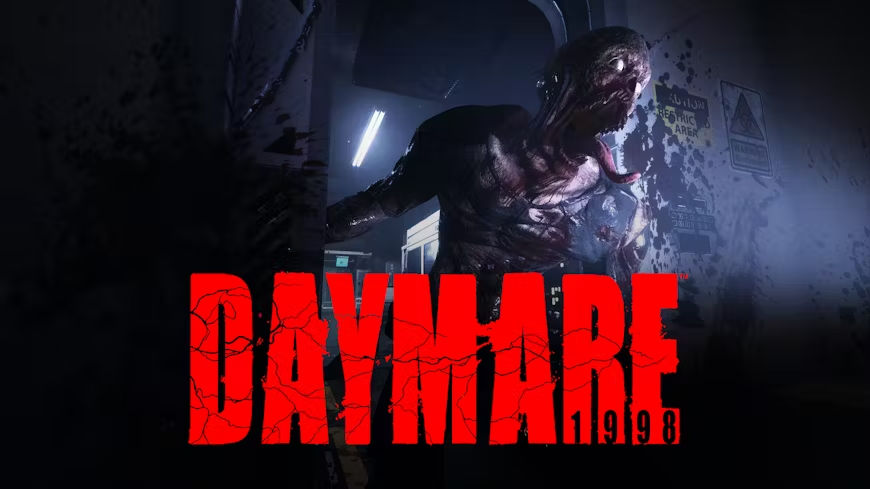
Daymare: 1998 drops players into the chaos of a small American town torn apart by a biochemical catastrophe. A deadly virus, born from the experiments of the Hexacore Advanced Research Corporation, spills into the streets, turning citizens into grotesque monsters. The story unfolds through three intertwined perspectives: a cold government operative, a conflicted Hexacore employee, and a resilient forest ranger. Each must navigate the outbreak while uncovering the dark conspiracy behind it, battling both external horrors and their own fears. What begins as a containment mission quickly spirals into a descent through paranoia, corporate betrayal, and survival against impossible odds.
Developed by Invader Studios, Published by Destructive Creations the game was released in 2019, Daymare: 1998 is a modern survival horror title steeped in nostalgia for the genre’s golden years. The game pays homage to the classics of the late ’90s, with its themes of bioterrorism, shadowy corporations, and the terrifying consequences of human experimentation. At the heart of the narrative lies Hexacore’s ambition to weaponize viral strains, leading to grotesque mutations and an outbreak that devastates the once-quiet town of Keen Sight. By telling its story through multiple characters, the game gives players a fragmented, unreliable perspective, keeping them guessing about who to trust and what horrors await around each corner.















Gameplay
Daymare: 1998 thrives on tension and deliberate pacing, demanding that players think carefully before acting. Ammo and healing items are scarce, emphasizing the need for resource management. Combat is weighty and methodical, forcing players to aim with precision while dealing with slow, relentless enemies. A standout feature is its inventory and reload system: magazines must be managed in real time, meaning reloading during combat leaves players dangerously exposed. This mechanic creates constant vulnerability, echoing the survival horror philosophy that every decision could be the difference between life and death.
Visuals & Style
The game captures the bleak, industrial atmosphere of late ’90s horror, blending sterile laboratories, abandoned streets, and dimly lit interiors with grotesque detail. Its environments feel oppressive, each corner suggesting danger that may or may not materialize. Audio plays a crucial role in building tension groans in the distance, distorted static, and unnerving silences force players to remain on edge. While inspired by its predecessors, the game doesn’t simply mimic; it injects a gritty, modern layer of realism that enhances its sense of dread.
Importance in Survival Horror History
Daymare: 1998 is significant for showing how indie developers can reinterpret survival horror’s foundations for a modern audience. Born from Invader Studios’ passion for the genre and originally envisioned as a fan remake of Resident Evil 2 that was going to be called Resident Evil 2: Reborn until Capcom intervened and politely asked them to stop. Then it grew into its own beast, a love letter that proved survival horror thrives outside of big-budget studios. Its emphasis on atmosphere, vulnerability, and story driven fear helped bridge the gap between nostalgic mechanics and fresh design ideas, reminding players why the genre became so beloved in the first place.
Reception vs Historical Value
Reception to Daymare: 1998 was mixed. Fans praised its atmosphere, inventive reload system, and dedication to classic survival horror, but some criticized its clunky controls, stiff animations, and uneven voice acting. Yet over time, it has earned recognition as a cult entry in the genre. Historically, it is remembered less for polish and more for passion: a raw but ambitious project that demonstrated how indie developers could rekindle the spirit of ’90s horror while pushing new ideas into the mix.
Availability & Collectibility


Daymare: 1998 is widely available on PC, PlayStation 4, and Xbox One through digital storefronts, making it accessible to most players interested in survival horror’s modern revival. While physical copies exist, they are more niche collectibles than mainstream releases. Its real value lies in its legacy: a project born from fan devotion that transitioned into a full-fledged game, marking Invader Studios as one of the few indie teams bold enough to resurrect survival horror’s classic DNA on such a scale.
Get it on:
Steam: Daymare: 1998 on Steam
GOG : Daymare: 1998 on GOG.com
PSN: Daymare: 1998
Trailer:
